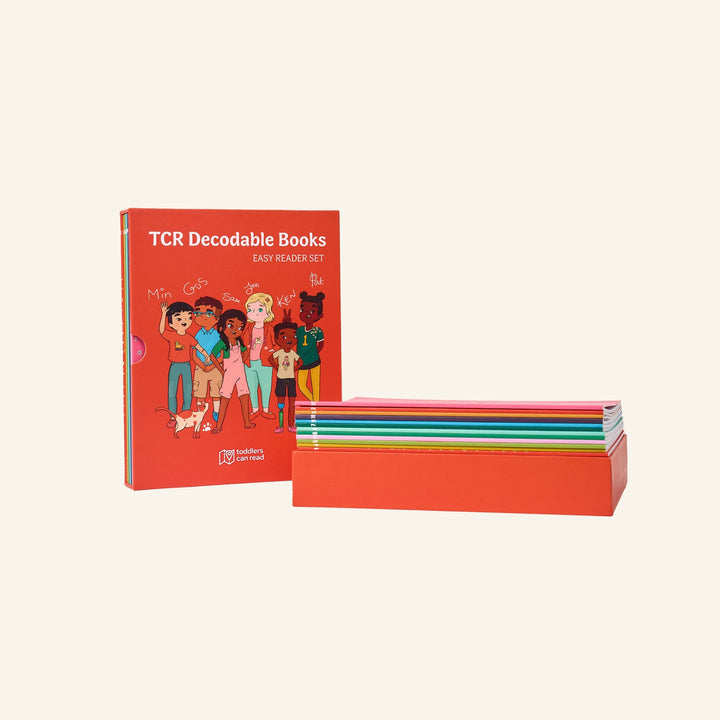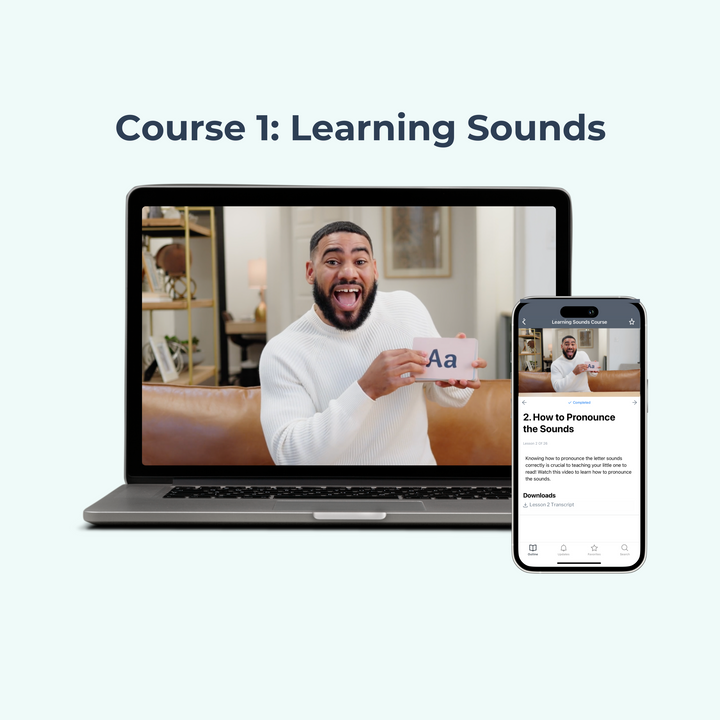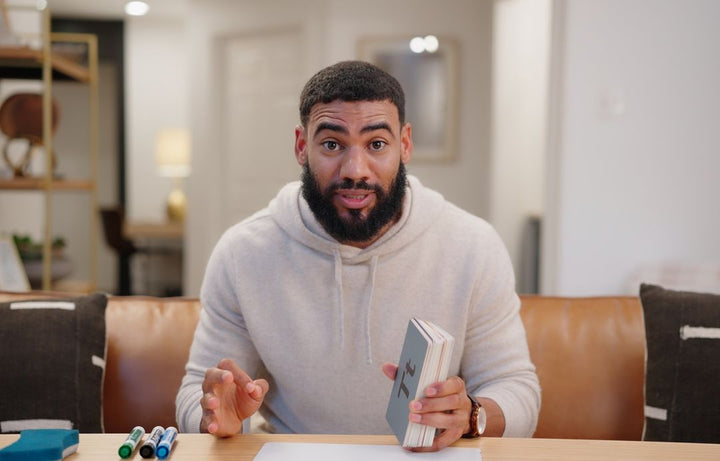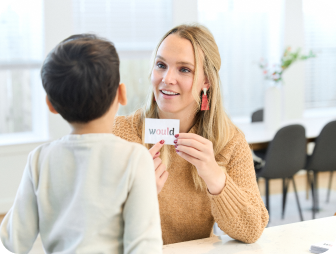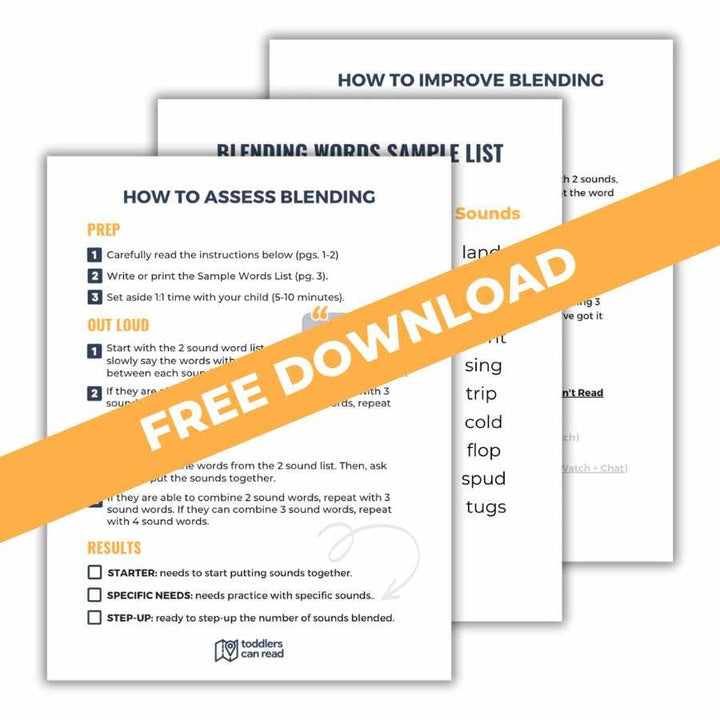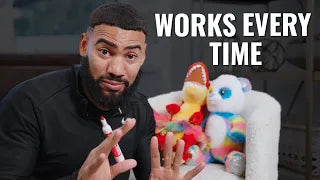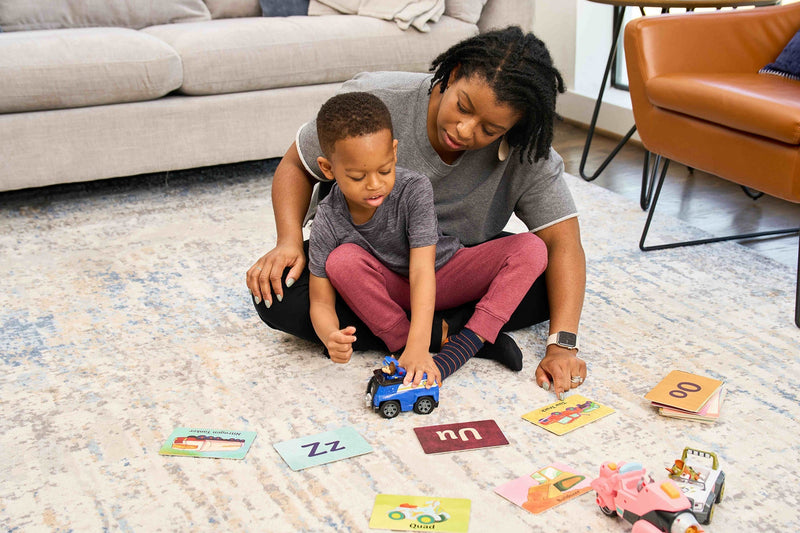Let's be honest: You won't see this list at your pediatrician's office. You're not going to find it in your copy of What to Expect While You're Expecting or mentioned by your favorite toddler influencer on Instagram or TikTok. And here's why:
Most of the toddler "experts" we trust (whether they're accounts, apps, books, or blogs) are focused on our little one's PHYSICAL milestones... not their LEARNING milestones. And even if they do mention some of those cognitive milestones, they often get it wrong and underestimate what our children are really capable of.
I'm not going to do that. I'm not going to underestimate what you or your little one is capable of. Instead, I'm going to tell you the 4 signs your little one is ready to read.
This list is short, it's simple, and it's concrete so you can feel 100% confident if/when you decide to take the plunge and teach YOUR little one how to read!
So, here are the four questions you'll need to answer in order to know if you can teach your child how to read.
- Can they literally say the sounds?
- Can they remember simple objects or names?
- Do you believe that they can focus?
- Are you ready to get started?
Sign #1: Their Oral Language
If you've ever found yourself asking: "How do I know my kid is ready to read?" then you're not alone. It's one of the most common questions folks ask me, and the first sign you should look for is whether or not they can literally pronounce most of the sounds.
Think about it like this: any time they make a sound or say a word, they're giving you information about the sounds they CAN and CAN'T pronounce yet (even if it's just babbling!)
For example: If they say the word "dada," then you already know TWO sounds they're able to pronounce: the /d/ and the /a/ sounds!
Or if they can say the word "truck" (my son actually learned another word that rhymed with this and was much easier for him to pronounce 😬) then that's even MORE sounds they can say (like the the short vowel /u/ sound or the /k/ sound.
And why is this important? Because if they can say the sounds when they're speaking, they can definitely say the sounds when they're practicing them. This is why I often say, "If they can say the sounds, they can learn the sounds. And if they can learn the sounds, they can learn how to read."
If your little one knows most of the sounds but not all of them: don't sweat it! Start with the sounds they CAN say and then build on from there. And if your little can't say many of the sounds yet? My advice is typically to continue to focus on building their oral language since that will be incredibly helpful when they do learn how to read.
What if my child is non-verbal, has a speech delay, or has a speech impediment?I'll be honest with you: Generally my advice is to focus on building their oral language until they can literally pronounce the majority of the sounds. But there are definitely still ways to introduce the sounds to your little one even if they can't say all of them yet.
For example: if your little one is unable to say a particular sound, you can still show them the letter and tell them the sound (since we know kids' brains are like sponges and they're always taking things in- even if they can't communicate it yet.)
You can also play games with the sounds where they run to the sound that says /s/, or jump on the sound that says /y/, or pick up and throw the sound that says /i/. Your little one can do ALL of these activities without ever having to actually SAY the sound. And if you want to see some more examples, I explain more about learning sounds despite speech and language barriers here.
Can your little one say their sounds?Do they have to be able to say each of the 26 single letter sounds perfectly before you get started with them? No. But it is important to stop and ask yourself "How well can they say their sounds?" because despite all of the focus on children knowing the LETTERS of the alphabet, it's knowing the letter SOUNDS that will actually help them learn how to read. You read that right: knowing the ABC song actually isn't all that important (no matter how much this song slaps.)
Follow these steps to assess how many sounds they can say:
- List the letters of the alphabet.
- Quickly jot down the words/phrases you know they can say.
- Check off the letters whose sounds you know they can say.
- Cross out the letters whose sounds you know they can't say yet.
- Circle the letters whose sounds you're not sure if they're able to say
- Have them attempt to say each of the circled sounds (and check them off or cross them out as you go!)
Sign #2: Their Memory
When I started teaching my son his sounds, he was 18 months old. I say this with all the love and respect I can, but he wasn't the "brightest" toddler in the world. He may have been the cutest, but definitely not the most advanced. He wasn't an early crawler, an early walker, an early eater, an early signer, an early clapper, or an early talker. In fact he hit most of the major developmental milestones either "on-time" or "late."
But none of that mattered in teaching him how to read. What did matter: could he remember things? Could he learn someone's name and then remember who they are? Could he learn about a new type of truck and remember what it was called? Could he remember the words for objects around the house like ball, stove, or couch? And he could, so we got started.
You see: in order to learn how to read, your little one needs to be able to learn each of the letter sounds. This means when you practice a letter sound with them, they need to be able to remember that sound when they see it again. And while this may sound pretty academic for your little one (especially if they're a toddler,) it's actually no harder and no easier than remembering anything else!
So whether you've already taught your little one some more academic things like colors and shapes, or if you've just taught them the names of people or objects: if they can remember what they learned, they can remember their sounds. It's that simple.
Can your little one remember simple objects or names?I encourage you not to overthink this. If your child is at the stage where they can remember what the things in your house and everyday life are (even if they can't repeat it back), their memory is probably in a good place to start learning and remembering the sounds. If they can hold what the sounds are for a few letters at a time in their memory, they are well on their way because the sounds are the first and biggest stage to learn how to read.
Sign #3: Your Belief in Their Ability
The last two signs here might ruffle some feathers. And that's OK. Because my job isn't to tell you what you want to hear: it's to tell you the truth. And the truth is our little ones are often capable of a lot more than we think they are. So if we don't believe in their ability to do it, then nothing else matters; they're not going to be successful.
So the third sign you want to look for is not about them and their ability, it's about you and your beliefs. Do you believe your little one can focus on the sounds long enough to learn them?
Notice that I didn't ask CAN your little one focus on the sounds long enough to learn them? That's because I personally believe they can do it. I asked do YOU BELIEVE they can focus on the sounds long enough to learn them? Because children certainly don't need to focus for very long. They don't need to sit still, or follow every direction, or act like a robot.
But they will need to focus on the sounds. Even if it looks like:

So not only should learning the sounds be fun- as demonstrated above- but if your little one is focused on the sounds, it should also be relatively quick. They don't need to (and really shouldn't) focus for any more than a few minutes at a time. And just to be honest, I can guarantee you that even 30 seconds of "focus" on the RIGHT number of sounds taught the RIGHT way will go a lot further (and feel better) than 10 or 15 minutes struggling to stay on track.
Ultimately, what we believe about our little ones matters. It matters a hell of a lot. So regardless of whether they can pronounce some of the sounds and they can remember basic things but you don't believe they can focus on the sounds during the learning time... then guess what? They can't. Because whether you believe they CAN or they CAN'T: you're right!
Do you believe your little one can focus?I have lots of parents tell me that their kid can't sit still. And that's fine. It's not my place to change someone's mind about their little one if they've made it up. Personally, I'll just say that I do believe that all kids can focus on the learning if we are committed to learning the best ways to do it.


And if 1) they can say the sounds, 2) they can remember the sounds, and 3) you believe they can focus then what else could you possibly be missing? Can you guess what it is?
Sign #4: Your Readiness
No matter how "ready" your little one is to start reading, if you're not ready to make the time to teach them, it will not work. So how much time does it take, and how committed do you need to be?
Well, honestly, there isn't one exact answer and it's going to vary from kid to kid and situation to situation. What I can tell you confidently though is that it doesn't need to take a LOT of time, but it does need to be CONSISTENT.
For example: Practicing 2 minutes/day with your little one for 10 days (20 minutes total) is going to be far more effective than doing that same 20 minutes/day with them once. Does that make sense?
So when we answer the question of: how much time does it take? We have to start with the question of: how much time do we have? And this is where I often hear folks say: I don't have ANY time. And I get it. I know that everyone's schedule is different and everyone has different priorities.
And transparently, when I was working with my son, I was pretty busy. I had just gotten a promotion and was working longer hours helping my company navigate the early stages of the COVID crisis. I was also taking care of my son during work breaks, tutoring my colleague's children on Zoom during lunch breaks, and working out twice a day to stay sane and prepare for a race (it was actually a Turkey Trot that I was taking way too seriously).
I was very tired and very busy, but my son's reading was a priority for me so I made the time every day to work with him. Sometimes, it was early in the morning before his breakfast. Other times, it was later in the evening after a workout. Often, we reinforced his learning in the stroller on our walks or at different times around the house. And while it wasn't always perfect, it was almost always consistent.
And I don't share this to say like, "Look at how amazing I am!" Because that's not the point. I share my experience because I believe deeply that we make time for the things we prioritize. In my case, it was family, fitness, and my son's development. Those were the things that were important to me and that's what I did. There were tons of other things that I didn't do, that I didn't feel like I had time for, and that I didn't prioritize.
If you want to teach your little one to read, it doesn't need to be your TOP priority. In fact, given how many other skills your little one needs to develop I'd actually encourage against it being your top priority. But it does need to be ENOUGH of a priority that you're willing to consistently spend a few minutes/day working with them.
Are you ready to get started?I'm not going to lie to you: I had an advantage getting started with my son because I knew a lot about teaching reading. It was something I was good at. But despite the success I had experienced as a teacher, something I had never done was teach my own child to read (let alone by 2 years old.) I didn't have a step-by-step program like Toddlers CAN Read to follow. I didn't have people I could look to for advice who had done this before. And I certainly didn't have any accounts or articles or even Google searches telling me it was possible.
What I did have was a commitment that my son would read at 2 years old. It was a priority for me, so I spent a few minutes/day working with him the best I knew how. And knowledge helps. Teaching experience helps. But there's ultimately no substitute for actually putting in the time and putting in the work.
Follow these steps to plan a strong reading routine:
- Find 5 minutes in the day that works well for BOTH of you
- Pick a space where they can focus on the sounds
- Prep any materials you need for the learning time
- Preview the routine ahead of time (no surprises)
- Set a timer for 1-5 minutes and show some sounds!
It's almost hard to describe the joy of seeing your little one learn their first sounds or read their first words. I know this is something I've gotten to experience first hand with my son and that so many of the families who have taken my courses have experienced with their little ones as well.


And I know this might feel like a lot. For many of us, we can't remember how we learned to read, let alone how to teach it. You may not have any teaching experience or have a lot of time. But at some point in your parenting journey, you will both have to climb the mountain of teaching and learning a new skill.
The good news is: You don't have to do any of this alone. I built my Toddlers CAN Read Courses for folks just like you—regardless of your background- to help you teach your little one to read, well.
Still unsure about whether or not your little one is ready to read? Take this quiz for a little more guidance.
And ultimately, there is no set age that ANY child needs to learn how to read. And I'll never say there is. So if you decide based on this list that it makes more sense to wait before getting started: wait! And if you decide that both you and your little one are ready to go: I'm here to help you get it done. Let's do it!


